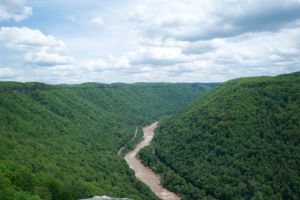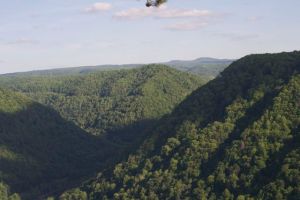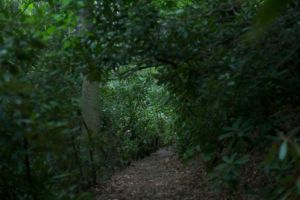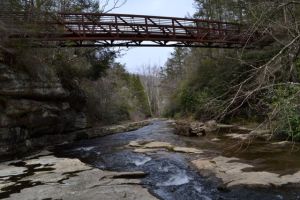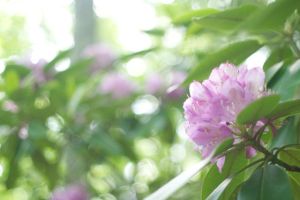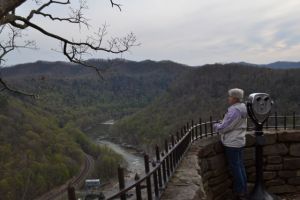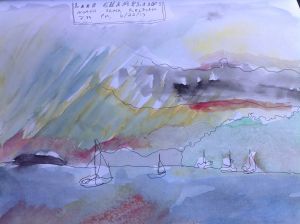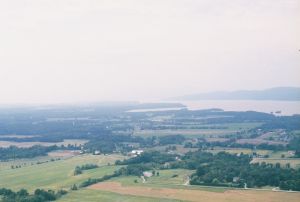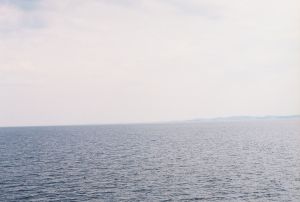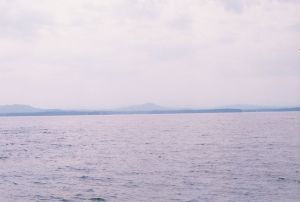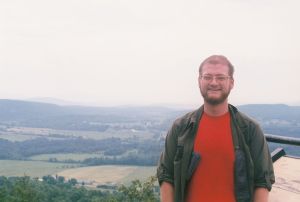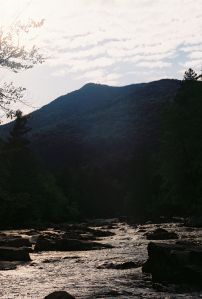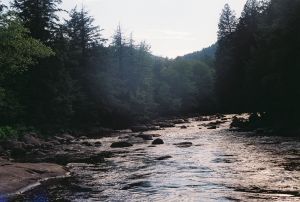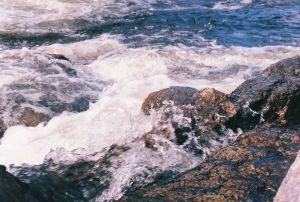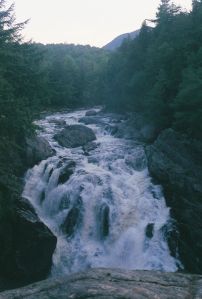6/23/2013 – Burlington, Vermont
My first full day in Burlington was a Sunday, and I made my way down to a well regarded coffee shop called Muddy Waters. They opened at 8:30 – late, I think, for a coffee shop, but the wait was worth it. The cafe was rustic, dark and wooden; the brightest light came from the large windows, which seemed blinding by comparison. I got a cappuccino from the barista – it was okay – nothing compared to Sam’s work at The Espresso Bar – but good enough. I took my mug and book and settled in watching the window, waiting for the caffeine to do what it does – light a roasty fire in me, make me burst out laughing at everything – the sensation of my own exploding cells.
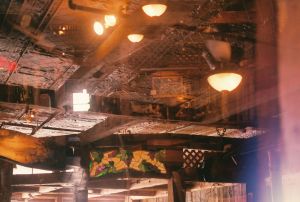
Muddy Waters, double exposure.
I read Gary Nabhan’s novel “Coming Home To Eat,” his story of eating regional food for a year. The founder of Native Seeds/SEARCH, Nabhan is the keeper of food history for the Sonoran desert. The book is full of explorations of cactus fruits, mesquite tortillas, roasted grasshoppers, almonds, smoked turkey, and other foods that are products of the desert. His prose is beautifully phrased, wavering from the political and analytical science-minded, to prose evocative of Thoreau, Wendell Berry, and Aldo Leopold.
It is an effective read although not without its flaws – the economics of how he does this feat are largely mysterious. Nabhan was the recipient of MacArthur “Genius” grant: this puts him far above most people in terms of his own means. But truly, I don’t want to discredit the book – I love it. It is a meditation on experience, and a valuable and worthwhile goal for us to set on a regional basis if we so choose. Perhaps part of being human should be that who you are is built from foods in your biome. In The Etiquette of Freedom, Gary Snyder writes: “Our bodies are wild. The involuntary quick turn of the head at a shout, the vertigo at looking off a precipice, the heart-in-the-throat in a moment of danger, the catch of the breath, the quiet moments relaxing, staring, reflecting – all universal responses of this mammal body” Eating food – and learning what’s edible, how to harvest it, how to prepare it, from our place can give us a portal into the magic and science of our biogeographical place; allow us to explore our own wilderness.
* * * *
I biked to the UVM Waterman building around noon and checked in. I grabbed some ice tea and immediately went and talked to Vic, who had been our online facilitator the past two weeks. Here he was, in the flesh, PHD in agricultural etymology and all. I was nervous, which expresses itself in a kind of overzealous enthusiasm. But that’s okay, these are all my people. We started to trickle in – I’ll just go through some – Val, a high school skills & nutrition teacher from New Hampshire; Bethy, who studies gastronomy & food policy at Boston University; Sophie, who works at Saxelby Cheesemongers in New York City and also co-hosts a radio show about cheese on the Heritage Radio Network; Kelly and Roger; a teacher/student duo from the Maine Academy of Natural Sciences; Yuting, a recent Wellesley graduate from China who was about to take a job in Washington DC trying to increase food safety standards in China; Erin, a New Hampshire biochemist with an MS in nutrition who chairs a nonprofit called the Food Education Network; Scott, the director of research & strategic initiatives at Project Bread; Mario, who is working to reform the regional food system of the Florida Everglades…the list goes on and on and on.
I know them now, but then it was the beginning, sitting in chairs and listening to Cynthia Belliveau tell us that when she teaches her class in South America, she calls it “cooking as resistance…”
* * * *
The UVM Breakthrough Leaders Program, unsurprisingly, focuses on leadership – with the goal of creating a more sustainable food system; but leadership skills can be drawn out of all parts of society. I am going to break chronology here when it makes sense for me to do so, but what’s a little time travel among friends, dear reader?
I have not thought about leadership. Many ‘leaders’ we spoke to, when asked specifically about their leadership, first exclaimed that they did not see themselves as leaders. So we have a problem of language. What is it that we are talking about? If I am a leader, I see my leadership like the dimmer stars at night – I can’t see them by looking straight at them. But now here is an opportunity for telescopic vision. I have seen leaders that do nothing more than hold on to ideas they feel to be deeply true; philosophies truer than fists and feet, more solid than brick and steel. But not only are these thoughts held, sharply defined and measured like diamonds, they are expressed outwardly. So: doing something, for a reason that makes more sense to you than anything else. A good leader may perceive that they have no other recourse but to invest their lives into what they see as integral.
Good leaders are like mushrooms – they replicate and spore the values on which their work is based into others – clients, co-workers, peers, competitors. Leadership is also keeping your own passion alive and turning it into a communicable form that replicates itself in others. Some people are leaders because they believe in pottery, guitars, clothing, wool, strawberries, cheese, chocolate, garlic, airplanes, outer space, bicycles. These are people whose imaginations have been caught as if on a blade by the shapes, flavors, sensations of the reality they choose to inhabit. Even better leaders – do-ers – thinkers – invest in a way to keep the core of themselves pulsing. Reality is hard: the sun burns our necks; lettuce planting breaks your back; email piles up; projects fail; knowledge is power but too much knowledge overwhelms – you cannot deal with all the impossibles at once: governmental change, revolution, economy, health, corporation, war – the worlds of our interest spin on the shells of these turtles on turtles of structure and paradigm! And so– revitalize, refocus, build feedback and recess and rethinking into process – maintain the structure of the seed that grew the oak openings.
* * * *
Your economy is what you choose to measure. I’m a big fan of outcomes based action. I believe in the scientific method and that means measuring things. But what do you measure? What you choose to measure can be rooted in your priorities and philosophy. Brendan Fisher, a research scientist at the World Wildlife Fund, showed us a study that, among other things, tracked birds and dung beetles. These, he said, were markets of biodiversity in rain-forests. They collected data on these variables for three different types of rainforest: Unlogged, those that had been logged once and replanted, and those that had been logged twice and replanted. They also graphed the dollar value of logging those rain-forests. The markers of biodiversity did not decrease that much – what did decrease, drastically, was the dollar value of those rain-forests. This means that an organization which keeps conservation as a core tenet can purchase once or twice logged rainforest that is still surprisingly biodiverse at a much lower cost than unlogged forest.
Your metrics should reflect your core philosophy. Over and over we saw this – to build a system from the heart of belief that will check itself against the values you hold. And, in determining your metrics, you get to ask that necessary question again – who am I? Why am I here?
In systems like the food system, we can easily understand that change in one part of the system has tradeoff effects in another part. We can simply this using the SEED model – Social, Economic, Environment, Diet/Health. Much of our food system is focused on maximizing the returns of the economic portion of the equation, and the tradeoffs of that wide-scale aggregate choice are evident throughout the other areas – inequalities between large producers and distributors such as Wal-Mart and its suppliers; water pollution, the disturbing nature of industrial pig farms, antibiotic resistant microorganisms from the use of antibiotics in livestock, an obesity epidemic, a diabetes epidemic, and all of these poor health outcomes occurring earlier and earlier. Tradeoffs are inherent in any system.
We ended the classroom portion of the day and went upstairs to dinner. It’s always fun to try to figure out where people go from strangers to becoming friends. It might have happened there, in the midst of talk about metabolism, baby names, nicknames, and how we all wanted to change the world. It continued as we left, found ourselves walking down the hill toward a local Vermont brewpub in the middle of downtown, and later to the waterfront, which was dark and quiet. We had forgotten it was a Sunday.
